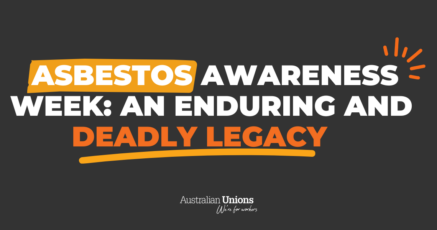Paid sick leave – a right that union members won and continue to fight for a century later – is fundamental to the health and well-being of workers.
Paid sick leave is so important because it gives workers the right to put their health and well-being first – as well as the health and well-being of their workmates – without sacrificing or pay.
Without access to paid sick leave, workers have to choose between going to work while sick or injured, or sacrificing a day’s pay. An impossible choice to make, especially in a cost-of-living crisis.
The ACTU’s 2023 Work Shouldn’t Hurt survey reveals that over half of insecure workers (including fixed-term and independent contractors, casuals, and gig platform workers) have reported continuing to work while ill or injured specifically, due to the absence of paid leave.
No one should have to go to work when injured or ill simply because their job lacks the most basic of protections. Under the current law, if you’re a casual or gig worker and are injured or ill you’re forced to make the difficult decision of either taking time off with zero pay or going to work and likely worsening your condition.
Liam O’Brien
ACTU Assistant Secretary

Workers who are at higher risk can’t afford to not work
While 18 percent of injured workers in secure jobs reported being unable to take time off due to lack of paid leave, in comparison, this jumped to half of all workers in insecure work.
And nearly 7 in 10 workers in insecure work said that they did not take time off simply because they could not afford to – an increase on the survey results from 2022 and 2021.
What’s more, the survey also found that people in insecure work are more likely to experience physical injuries than those in secure employment, with 7 per cent of secure workers reporting a physical injury compared to 11 per cent of insecure workers.
Mental injuries for those in insecure work also rose from 13 per cent in 2021 to 20 percent in 2023.
Closing casual loopholes will protect worker health and safety
We know there are over half a million casual workers in Australia today who would prefer to be permanent employees.
But less than 5% of casual workers who want permanent jobs can secure one.
The Albanese government’s Closing Loopholes Bill includes reforms that would introduce a commonsense definition of casual employment, and a fairer pathway for an eligible employee to choose to become permanent.
For long-term casual workers in insecure employment, these practical changes would open up the opportunity of converting to permanent work for greater job security and access to entitlements such as a paid sick leave.
That means no more impossible decisions between showing up sick or missing out on a day of pay.








SHARE:
Half of workers are working while sick or injured